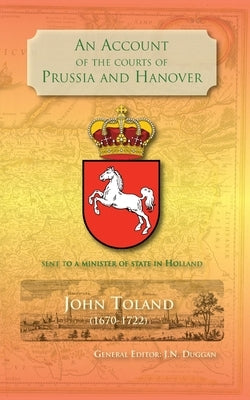Even after more than 300 years, John Toland's
Account of the Courts of Prussia and Hanover remains highly readable and continues to be cited by historians of the period. It gives us an engaging and accessible picture of life in those German courts, and of the people who inhabited them at the turn of the 17th to 18th Century.
Toland travelled to Hanover in 1701, with Lord Macclesfield's delegation, to deliver the Act of Settlement to the Electress Sophia, which named her Protestant descendants as heirs to the British throne. Toland was well received by Sophia, who also introduced him to the court philosopher, Gottfried Wilhelm Leibniz. The following year, he visited the court of Berlin, where he was received by the Electress's daughter, the Queen in Prussia, Sophia Charlotte.
His impressions and observations of those visits are recorded in this Account and faithfully preserved in this new edition, which has previously been available only in facsimile reproductions. The text has been reset using a modern typeface but with original spelling, emphasis and formats preserved.
Author: J. N. Duggan, John Toland
Publisher: Manuscript Publisher
Published: 08/11/2013
Pages: 98
Binding Type: Paperback
Weight: 0.25lbs
Size: 8.00h x 5.00w x 0.23d
ISBN: 9780957672918
About the Author
John Toland (1670-1722) was an Irish born scholar and philosopher of international renown. In his considerable volume of writings, he challenged political and ecclesiastical authority and was a prolific writer on important political and religious issues of his day: a radical republican who questioned the divine right of kings; a diplomat whose Account of the Courts of Prussia and Hanover is still quoted by historians of the period; the first person to be called a freethinker (by Bishop Berkeley); the first to advocate full citizenship and equal rights for Jewish people.
John Toland was born in Donegal, Ireland to a Gaelic-speaking Catholic family on 30 November 1670. At the age of sixteen, he joined the Church of Ireland, which enabled him to receive an education at the Protestant school of Redcastle. He attended the University of Glasgow, where he gained a scholarship to study theology and later graduated with a Master of Arts from Edinburgh University, in July 1689 (the day before the Battle of the Boyne, as he later recalled). He also attended the University of Leyden before returning to England, where he stayed in prominent Whig households in Oxford and London, earning his living as a propagandist for the Whig party.
He is chiefly remembered today for what was, in fact, his first work,
Christianity Not Mysterious (1696) - a book which was denounced in the English and Irish Parliaments and publicly burned in Dublin.
J.N. Duggan, who is the General Editor for this project, first came across the name of John Toland while researching her biography of
Sophia of Hanover: Winter Princess, which was published by Peter Owen Publishers in 2010 (ISBN: 978 0 7206 1342 1). This prompted her to write her own short biography of Toland -
John Toland: Ireland's Forgotten Philosopher, Scholar ... and Heretic published the same year (ISBN: 978-1-907522-08-6).
This title is not returnable


